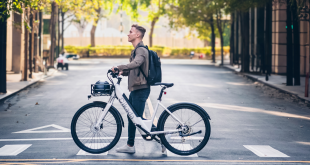Georgia Yexley is one of the most respected voices in the micromobility space. Daniel Blackham caught up with her to hear about her new venture, Loud Mobility
This piece first appeared in the August edition of BikeBiz magazine – get your free subscription here
Georgia Yexley is best known for her roles at Mobike, Beryl and most recently as general manager for UK and Ireland at shared transport provider Tier. Earlier this year, she decided to take a career break but now finds herself as busy as ever with her own company – Loud Mobility.
Loud Mobility, a consultancy that supports sustainable mobility projects, campaigns, organisations, was originally founded in 2020 with a university friend, but life got in the way for the duo and it was left dormant.
“I had put quite a lot of myself into the branding,” said Yexley, “the concept of Loud Mobility is something that was personal to me so I retained the entity and held on to it.”
After leaving her role at Tier, Yexley proceeded with the career break by meeting up with old friends and doing things she enjoyed.
“I was following the things that I found interesting, meeting with people that I love talking to just discussing interesting things with interesting people, which is actually just what I love to do,” she said.
“And off the back of those conversations being really open, talking about the gaps and the opportunities and the possibilities, people started coming to me with ideas, and projects, partnerships.
“So somehow, in the midst of a career break, I ended up accidentally starting a business.”
Loud Mobility 
So what is Loud Mobility, and what does it stand for?
“It’s all about stepping out of that exchange based on your P&L [profit and loss],” said Yexley.
“There’s a few organisations across many industries that focus on system change, and there’s a few organisations in mobility around the world that have that focus. But really, it’s about stepping out of any of those sectors specifically.
“So, I wouldn’t put Loud Mobility as a public sector, third sector, private sector business, it’s focused on cross-sector. Thinking more about the system as a whole, and how to influence broadening participation in sustainable mobility.”
Within the conversation on expanding participation, Yexley has a clear vision of what brands and other organisations should be hoping to achieve.
“Is everyone enjoying transport to the same degree? Is it playful? Was it fun?” she said.
“We should be making it more accessible for a greater number of people, making it easier, and doing that on the principles that I believe to be really important in this space, which is not just your bare minimum of safety and fairness, but actually saying ‘is it engaging, is it exciting?’”
Although there’s an understanding that legislation, safety and infrastructure are crucial parts of the participation discussion, the casual end-user is unlikely to prioritise these over their surface level experience.
“It’s enough to say that riding a bike, going on a scooter, walking in the park with friends, is fun. It doesn’t have to be more than that,” said Yexley
“Sometimes things are far too polarised and made into these battles of will, far on one end against far on this end, about the smallest things like a bollard in the streets, as if that’s something that people are really battling about in their day-to-day lives.
“We want kids to be safe, sure, but we also want them to have fun.” Throughout her seven year career in the micromobility industry, Yexley has seen a collaborative approach act as a key component to success and growth in the sector.
Now, she would like to see more of it on these shores.
“In the USA, Southeast Asia, Australia, in Latin America, all over the world, cross-sector collaboration is happening,” she said.
“You’ve got the local authority, the transport authority, the operator, the advocacy groups, all agreeing and focusing on the same direction – working together.
“Cross-sector collaboration, with a focus on benefits, delivers results.”
 Passion projects
Passion projects
Although it’s only been a full-time operation since the start of the year, Loud Mobility has already started to work on some large-scale and important projects.
The first of these is delivering World Bicycle Relief’s global charity partnership with UCI Cycling World Championships.
World Bicycle Relief has the goal of mobilising people through its tagline “The Power of Bicycles” and combines non-profit programs with social enterprise sales to meet the need for reliable transportation in low-income regions.
In 2008, the charity founded a subsidiary called Buffalo Bicycles Ltd, creating a rugged hybrid model of bike. To date, more than 700,000 of these bikes have been delivered with the goal of reaching one million by 2025. As part of reaching that target, the charity is working with the UCI to create awareness around the project.
Loud Mobility will be helping the charity to deliver all of the fan zones, fundraising activity, promotional activity, Buffalo bike test rides, and being visible in the broadcast.
“We’ve got the buffalo bike, it couldn’t be less of a performance bike, it’s heavy and it’s sturdy,” said Yexley.
“We’re taking milk churns for people to try and move themselves and then try them on the back of the bike.
“It’s about taking that audience and expanding their view of what the power of the bike is.”
The second project Yexley is working on is in collaboration with Caz Conneller, the founder of Cyclechic and the She’s Electric campaign.
‘She’s Electric’ promotes the idea that e-bikes and e-cargo bikes can significantly help women overcome many of the common barriers to cycling.
The campaign is designed to achieve true gender equality in cycling by addressing the issue head on and supporting and helping women to feel safe on electric bikes.
“It goes beyond the typical context that’s given when you talk about women cycling of ‘I can do the shopping and I can drop the kids off at school’, “ said Yexley.
“Absolutely, that’s a really important aspect, but women are also mechanics, have different types of disabilities and different types of e-cycles.
“It’s about real role models of real women that have a broader representation and then also seeking to build that into a programme that has events and safe spaces and opportunities for women to connect with the cycles, ask questions and feel supported.”
Beyond mobility
The final project that we discussed was borne out of conversations with a number of community cycling projects.
“This is a really Loud-led initiative but it came out of being communicative through one of the women in cycling groups that I’m in,” said Yexley.
“Alex from Cloud 9 Cycles, which has now sadly shut down, reached out to the group and said, ‘it’s been hard to keep our doors open, I feel like there should be better ways of sharing best practice, better ways of creating community amongst this network, is anyone up for just having a chat about this?’
“It came into a bigger conversation around the lack of evidence, lack of research, the limitations in accessing funding, the limitations of support or accessing information.”
This led Yexley to delve deeper into how much information is out there. What help is available to a community start-up looking at putting together a funding application, or help to scale it up.
It turns out very little, so the Community Cycles Project was born.
“There are some people in the academic space that are doing some amazing work, but that tends to be on a really granular and focussed level,” said Yexley
“But what we realised is that on a national level, there’s a real lack of research, evidence and data around community cycling projects, identifying the impact that they are making in terms of broadening participation, lowering barriers to access and getting wider demographics of people into the cycling space.
“There’s also a lack of understanding and evidence around the barriers that they’re facing to scale that impact.”
As well as just research, the project looks to then go on to engaging wider stakeholders and actually developing solutions. If successful, it could lead to testing and trialling through feasibility work to support community cycling projects by making best practice, assets and tools available.
To date, the project has secured the Transport Research Laboratory (TRL) as a research partner, with a number of community cycling projects involved and interested in participation: “We’re looking at taking on a set of participants across England, Wales, Northern Ireland, and Scotland,” said Yexley, “we want this data to be valuable also for Active Travel England and regional transport bodies.”
It’s evident in the discussion that this is a passion project for Yexley that has been brewing for many years.
“If Loud Mobility delivers that bit of research, it never goes any further, I’ll be happy,” said Yexley.
“I will feel like I did what I wanted to do and that was to do something that’s really going to broaden participation in cycling, active travel, sustainable travel, in a way that is more than just driven by how many people are getting on bikes. This is the type of work that is the core, and it’s why Loud Mobility is always going to go onto something that’s much more than me.”
 micromobilitybiz Delivering news updates to the micromobility industry, focusing on e-bikes, e-scooters and green transport
micromobilitybiz Delivering news updates to the micromobility industry, focusing on e-bikes, e-scooters and green transport




